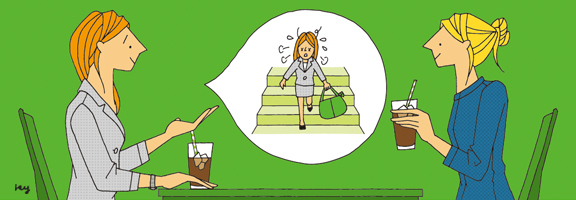会話を学ぶ「英会話講座」
2016.6.22
手相占いの話をしている

<手相を占ってもらったAnneとJulianaがカフェでその結果について話しています。>
EnglishJapanese
Anne:OK, so what did she say about your future?
Juliana:Well, she told me that I would meet a tall, dark, and handsome guy when I least expect it.
Anne:That’s exciting! Anything else?
Juliana:Yeah, she also said that if I keep my nose to the grindstone, my boss will soon recognize me for my hard work. How about you?
Anne:It was a bit weird. She told me that I should avoid elevators for at least two weeks.
Juliana:Elevators? So you’ve been taking the stairs everywhere?
Anne:Even at work! It’s driving me bananas.
Juliana:It’s a good thing you only work on the fourth floor.
Anne:Yeah. But there is an upside to the situation. I’ve already logged more steps this week in my fitness tracker than I did all last month!
Juliana:Wow!
Juliana:Well, she told me that I would meet a tall, dark, and handsome guy when I least expect it.
Anne:That’s exciting! Anything else?
Juliana:Yeah, she also said that if I keep my nose to the grindstone, my boss will soon recognize me for my hard work. How about you?
Anne:It was a bit weird. She told me that I should avoid elevators for at least two weeks.
Juliana:Elevators? So you’ve been taking the stairs everywhere?
Anne:Even at work! It’s driving me bananas.
Juliana:It’s a good thing you only work on the fourth floor.
Anne:Yeah. But there is an upside to the situation. I’ve already logged more steps this week in my fitness tracker than I did all last month!
Juliana:Wow!
Anne:それで、あなたの今後について何て言ってたの?
Juliana:それがね、背が高くて色黒のハンサムな人に思いもよらないときに出会うんだって、私。
Anne:それは素敵じゃない!他には?
Juliana:それから、一生懸命働き続けたら、いずれ上司が私の頑張りを認めてくれるとも言ってたわ。あなたは何て言われたの?
Anne:それがちょっと変な話なの。少なくとも2週間はエレベーターは避けたほうがいいって言われたの。
Juliana:エレベーター?じゃあ、どこに行っても階段使ってるの、あなた?
Anne:職場でさえそうなのよ。気が変になりそうよ。
Juliana:働いてるのが4階ぐらいでよかったじゃない。
Anne:そうね。でも、いいこともあるのよ。フィットネストラッカーの歩数が今週だけでもう先月の分を超えたのよ!
Juliana:まあ、すごいわね!
Juliana:それがね、背が高くて色黒のハンサムな人に思いもよらないときに出会うんだって、私。
Anne:それは素敵じゃない!他には?
Juliana:それから、一生懸命働き続けたら、いずれ上司が私の頑張りを認めてくれるとも言ってたわ。あなたは何て言われたの?
Anne:それがちょっと変な話なの。少なくとも2週間はエレベーターは避けたほうがいいって言われたの。
Juliana:エレベーター?じゃあ、どこに行っても階段使ってるの、あなた?
Anne:職場でさえそうなのよ。気が変になりそうよ。
Juliana:働いてるのが4階ぐらいでよかったじゃない。
Anne:そうね。でも、いいこともあるのよ。フィットネストラッカーの歩数が今週だけでもう先月の分を超えたのよ!
Juliana:まあ、すごいわね!
キーフレーズ
“when (one) least expects (something)” 思いがけず
これはまったく予想していなかった出来事や起こりそうもないと思っていた出来事が起こった際に使われる表現で、“when least expected”と言っても同じ意味になります。なお、好ましくない事柄について述べている文脈では、「最も起こってほしくないときに起こってしまう」という意味合いで使われることもあります。
例)Justinと妻のRoseが夕食を取っていると、電話がかかってきました。Justinが誰からの電話か確認しています。
Justin:It’s your boss. Do you want to answer it?
Rose:She always calls when least expected. Let it go to voicemail. I’ll call her back after dinner.
Justin:君の上司からだよ。出る?
Rose:いっつも最悪のタイミングでかけてくるの、あの人。そのまま留守電にしましょう。夕飯終わってからかけ直すから。
Justin:It’s your boss. Do you want to answer it?
Rose:She always calls when least expected. Let it go to voicemail. I’ll call her back after dinner.
Justin:君の上司からだよ。出る?
Rose:いっつも最悪のタイミングでかけてくるの、あの人。そのまま留守電にしましょう。夕飯終わってからかけ直すから。
“keep (one’s) nose to the grindstone” 一生懸命に取り組み続ける
これは非常に懸命に働いたり、勉強をしたり、練習などに取り組むことを意味するフレーズです。長期間にわたりそうした努力を続けるという意味合いを含んでいる表現です。
例)ディナーパーティーに出かけるJohnがルームメートのBernardに一緒に来ないかと誘っています。
John:Hey, you’ve been working on that project all week. Can you make it out tonight?
Bernard:Sorry, maybe next time. I’ve got to get this done. If I keep my nose to the grindstone I should be done by next week, though!
John:なあ、お前今週ずっとその課題やってるよな。今夜ぐらいは出かけないか?
Bernard:ごめん、また今度だな。これ終わらせなきゃいけないから。でも、この調子で頑張り続ければ、来週には終わるはずだから。
John:Hey, you’ve been working on that project all week. Can you make it out tonight?
Bernard:Sorry, maybe next time. I’ve got to get this done. If I keep my nose to the grindstone I should be done by next week, though!
John:なあ、お前今週ずっとその課題やってるよな。今夜ぐらいは出かけないか?
Bernard:ごめん、また今度だな。これ終わらせなきゃいけないから。でも、この調子で頑張り続ければ、来週には終わるはずだから。
“drive (someone) bananas” ~を気が狂いそうにさせる
腹が立ったり、苛立ったりして気が変になりそうな状況を言い表すフレーズです。かなりくだけた表現なので、友人などの親しい間柄以外では使い方に注意が必要です。“bananas” の代わりに“nuts”や “bonkers”、“up a wall”などを用いても同じような意味で使うことができます。
例)クラスメートのLexとKatherineが雨降りが続く最近の天気のことを話しています。
Lex:This rain is driving me bananas! The humidity makes my commute unbearable.
Katherine:Me too. It’s especially bad when the trains are full in the morning.
Lex:気が狂いそうだよ、この雨で。湿気が多い中、学校通うの我慢できないよ。
Katherine:私も。特に朝、電車が込んでるときが嫌だわ。
Lex:This rain is driving me bananas! The humidity makes my commute unbearable.
Katherine:Me too. It’s especially bad when the trains are full in the morning.
Lex:気が狂いそうだよ、この雨で。湿気が多い中、学校通うの我慢できないよ。
Katherine:私も。特に朝、電車が込んでるときが嫌だわ。
“upside to the situation” ~のよい面
一般に好ましくないと思われる状況が話題になっている場面で、そうした状況にもプラスの面があることを述べるために使われるフレーズです。反対に好ましい状況にもマイナス面があることを言う際には“downside to~”という言い方をします。
例)Raulと友人のFrancescaが一緒に夕食を取りながら、今週あったことを話しています。
Raul:Sounds like you’re having a pretty difficult week.
Francesca:Yeah, I guess so. But the upside to the situation is Saturday I’m going to my best friend’s wedding!
Raul:結構大変な1週間みたいだね。
Francesca:うん、そうなの。でも、ひとついいこともあって、土曜日に親友の結婚式に行くのよ!
Raul:Sounds like you’re having a pretty difficult week.
Francesca:Yeah, I guess so. But the upside to the situation is Saturday I’m going to my best friend’s wedding!
Raul:結構大変な1週間みたいだね。
Francesca:うん、そうなの。でも、ひとついいこともあって、土曜日に親友の結婚式に行くのよ!


 【Gabaからのお知らせ】
【Gabaからのお知らせ】 【特集】
【特集】 【英単語の正しい使い分け】
【英単語の正しい使い分け】 【使いこなす句動詞】
【使いこなす句動詞】